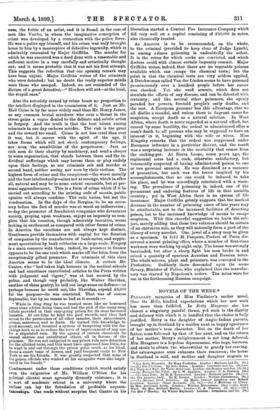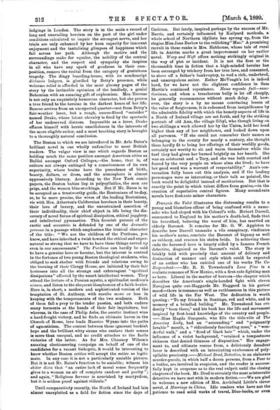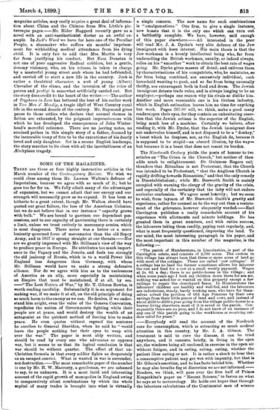NOVELS OF THE WEEK.*
PLEASANT memories of Miss Findlater's earlier novel, Over the Hills, kindled expectations which her new work has more than fulfilled. In Betty Musgrave she has chosen a singularly painful theme, yet such is the dignity and delicacy with which it is handled that the choice is fully justified. Betty is the daughter of Anglo-Indian parents, brought up in Scotland by a maiden aunt in happy ignorance of her mother's true character. But on the death of her father, soon followed by that of her aunt, and on the return of her mother, Betty's enlightenment is not long deferred. Mrs. Musgrave is a hopeless dipsomaniac, who begs, borrows, and steals to obtain the wherewithal to gratify her craving. Her extravagance soon exhausts their resources ; the house in Scotland is sold, and mother and daughter migrate to • (1.) Betty Musgrave. By Mary Pindlater. London : Methuen and 0. 16s.1 —(2.) The Puritans. By Arlo Bates. London: Constable and Co. (6g.)- (3.) Warp and Weft. By Violet Hobhouse. London: SheftIngton and Son. [3s. ad.]
—(4.) Francois the Valet. By G. W. Appleton. London: 0. A. Pearson. Ns.)
—(5.) Lone Pine. By R. B. Townshend. London: Methuen and Cu. (Se.]— (6.) The Amazing Lady. By B. Bowles. London William Heinemann. Ns.] —(7.) Michael Erred, Detective. By Marie Connor Leighton and Robert Leighton. London: Grant Richards. ps. 6d.]—(8.) A Marriage in China. Sty Mrs. Archibald Little. London : William Heinemann. (8s.)—(9.) Jock's Ward. By Mrs. Herbert Martin. London Cl. A. Pearson. [3s. 6■1:]—(10.) Two Men o' Mendip. By Walter B.nymond. London Longman; and Co. (61/
lodgings in London. The story is in the main a record of long and unavailing heroism on the part of the girl under conditions calculated to impair the strongest nerve, and her trials are only enhanced by her keen capacity for innocent enjoyment and the tantalising glimpses of happiness which fall across her path. Although the motive and the surroundings make for squalor, the nobility of the central character, and the respect and sympathy she inspires in all who have any spark of goodness in their com- position, remove the recital from the category of gratuitous tragedy. The dingy boarding-house, with its nondescript d6clasas lodgers, is glorified by Betty's presence, while welcome relief is afforded in the most gloomy pages of the story by the invincible optimism of the landlady, a genial Bohemian with an amazing gift of euphemism. Mrs. Trevose is not only an exquisitely humorous character, but she proves a true friend to the heroine in the darkest hours of her life. Rescue arrives from an unexpected quarter—not from Betty's fair-weather lover, but a rough, coarse-fibred " outsider " named Drake, whose latent chivalry is fired by the spectacle of her undeserved distress. Impossible as a lover, Drake effaces himself with heroic unselfishness in the interests of the more eligible suitor, and a most touching story is brought to a thoroughly natural conclusion.
The Boston to which we are introduced in Mr. Arlo Bates's brilliant novel is one wholly unfamiliar to most British readers. The vulgar view is one which regards Boston as holding much the same position amongst American cities as Balliol amongst Oxford Colleges,—the home, that is, of culture not always untinged by a consciousness of its own superiority, where brains have the precedence of birth, beauty, dollars, or dress, and the atmosphere is almost oppressively literary. According to the New York comic papers, the Boston babies lisp in polysyllables, the men are prigs, and the women blue-stockings. But if Mr. Bates is to be accepted as a trustworthy guide, the Bostonians of to-day, or, to be more precise, the wives of the leading Bostonians, vie with Mrs. Atherton's Californian heroines in their beauty, their love of luxury, and the unrestrained assertion of their individuality, their chief object in life being the dis- covery of novel forme of spiritual dissipation, ethical jugglery, and intellectual gymnastics. This feverish pursuit of the exotic and eccentric is defended by one of the dramatis persona' in a passage which emphasises the ironical character of the title : "We are the children of the Puritans, you know, and have inherited a twist toward the ethical and super- natural so strong that we have to have these things served up even in our amusements." The Puritans can hardly be said to have a genuine hero or heroine, but the interest is centred in the fortunes of two young Boston theological students, who, obliged to seek shelter with friends and relations owing to the burning of their Clergy House, are initiated by their fair hostesses into all the strange and extravagant 'spiritual dissipations" affected by the smart intellectual women. They attend the lecture of a Persian mystic, a spiritualist medium's seance, and listen to the eloquent blasphemies of a faith-healer. Here is, in short, a modern and sophisticated version of the temptation of St. Anthony, with results more or less in keeping with the temperaments of the two students. Both of them fall a prey to the tender, passion, and both endure many torments at the hands of their fair inquisitors, but whereas, in the case of Philip Ashe, the ascetic instinct wins a hard-fought victory, and he finds an ultimate haven in the Church of Rome, love leads Maurice Wynne into the paths of agnosticism. The contest between these ignorant bookish boys and the brilliant witty sirens who enslave their senses is more than unequal, and no credit attaches to the facile victories of the latter. As for Mrs. Chauncy Wilson's amazing electioneering campaign on behalf of one of the candidates for a vacant bishopric, it would be interesting to know whether Boston critics will accept the satire as legiti- mate. In any case it is not a particularly amiable picture. But it is not Mr. Bates's function to be amiable; witness his obiter dicta that "an entire lack of moral sense frequently gives to a woman an air of complete candour and purity "; and again, "Religious fervour is nourished by martyrdom, but it is seldom proof against ridicule."
Until comparatively recently, the North of Ireland had lain almost unexploited as a field for fiction since the days of Carleton. But lately, inspired perhaps by the success of Mr.
Barrie, and certainly influenced by Kailyard methods, a whole school of Northern idyllists has sprung up, from the elegiac Miss Jane Barlow to the rollicking" Mac." A promising recruit in these ranks is Mrs. Hobhouse, whose tale of rural life in Antrim marks a great improvement on her earlier novel. Warp and Weft offers nothing strikingly original in the way of plot or incident. It is not the first or the thousandth time in fiction that a high-minded heroine has been estranged by trickery from her true love, and consented, to stave off a father's bankruptcy, to wed a rich, underbred, and unscrupulous suitor. Esther McVeagh's lot is indeed hard, for we have not the slightest confidence in Sam Martin's continued repentance. Nemo repente fait—sane- tissimus, and when a treacherous belly is let off cheaply, he generally recommences without much delay. If, how- ever, the story is a by no means convincing lesson of the value of forgiveness, it is redeemed from insignificance by the admirable fidelity with which the homely aspects of life in a North of Ireland village are set forth, and by the striking portrait of old Ann, the village Sibyl, who though living on two shillings a week allowed her by the Union, held her head higher than any of her neighbours, and looked down upon all parvenus. "If she could not remember their names as belonging to the county for nearly a century, she thought them hardly fit to bring her offerings of their worldly goods, certainly not worthy to sit and warm themselves while the turf they had given her burned brightly on her hearth. She was an aristocrat and a Tory, and she was both courted and feared by the very people on whose alms she lived ; to have her good word was a warrant of respectability." Ann's con- versation fully bears out this analysis, and if the leading personages were as interesting, or their talk as pointed, the book would be delightful instead of meritorious. But that is exactly the point in which talent differs from genius,—in the creation of superlative central figures. Many second-rate novels have first-rate minor characters.
Francois the Valet illustrates the distressing results to a young and blameless officer of being confused with a name- sake who had eloped with his Colonel's wife. Hubert Darrell, summoned to England to his mother's death-bed, finds that his betrothed, believing the worst of him, has married an elderly Baronet. It remains for Mr. G. W. Appleton to describe how Darrell unmasks a vile conspiracy, vindicates his mother's name, convicts the Baronet of bigamy as well as robbery, and rescues his stolen bride. In achieving these ends the harassed hero is largely aided by a famous French detective, disguised as the Baronet's valet. The story is briskly told with precisely that amount of delicacy and distinction of manner and style which could be expected of an author who has entitled one of his works The Co- Respondent.—Mr. R. B. Townehend's Lone Pine is a realistic romance of New Mexico, with a first-rate fighting man as hero. Liberal in the matter of horrors—the chapter which describes the American's single-handed fight with eleven Navajoes quite out-Haggards Mr. Haggard in his goriest mood—there is romance as well as ruthlessness in this picture of wild life in the Far West. The dedication is worth quoting : "To my friends in Santiago, red and white, and in memory of a brindled bulldog." Mr. Townshend has evi- dently "been there," and his book has the life and movement inspired by first-band knowledge of the country and people.
Miss Magda Stacpoole, who fills the title-role of The Amazing Lady, had an " astounding " and "poignantly lovable" mouth, a "ridiculously fascinating nose," a "won- derful walk," and a flood of black hair" which, under the influence of a violet background, "retained a tempestuous richness that denied thinness of disposition." Her engage- ment to, and ultimate rescue from, a deliriously decadent lover is described with an intoxicating exuberance of poly- syllabic preciosity.—Michael Dred,Detective, is an elaborate murder-puzzle, in which half a dozen persons, from a Peer to a butler, are involved in suspicion, and the reader is success- fully kept in suspense as to the real culprit until the closing chapters of the book. Mr. Dred is certainly the most aristocratic detective we have met with in modern fiction.—We are glad to welcome a new edition of Mrs. Archibald Little's clever novel, A Marriage in China. Idle readers who have not the patience to read solid works of travel, Blue-books, or even magazine articles, may easily acquire a great deal of informa- tion about China and the Chinese from Mrs. Little's pic- turesque pages.—Mr. Rider Haggard recently gave us a novel with an anti-vaccinationist doctor as an awful ex- ample. In Jock's Ward we have for hero one of the Peculiar People, a shoemaker who suffers six months' imprison- ment for withholding medical attendance from his dying child. It is only fair to add that Mrs. Martin is very far from justifying his conduct. But Ezra Dunstan is not one of your aggressive Radical cobblers, but a gentle, dreamy visionary, who, on his release, is taken in charge by a masterful young street arab whom he had befriended, and carried off to start a new life in the country. Jock is rather a theatrical character, a sort of young (Albert) Chevalier of the slums, and the inversion of the roles of patron and protege is somewhat artificially carried out. But the story does credit to the heart of the writer.—The author of Tryphena in Love has bettered the best of his earlier work in Two Men o' Mendip, a tragic idyll of West Country rural life in the second decade of the century. Mr. Raymond gives pause to those critics who declare that normal themes in fiction are exhausted, by the poignant impressiveness with which be has developed the consequences of John Winter- head's merciful reticence. There are no jarring notes, no strained pathos in this simple story of a father, doomed by the inexorable irony of fate to be the executioner of his dearly loved and only daughter. Set in a serene English landscape, the story marches to its close with all the inevitableness of an .E9chylean tragedy.








































 Previous page
Previous page